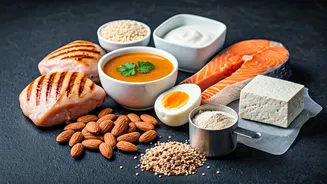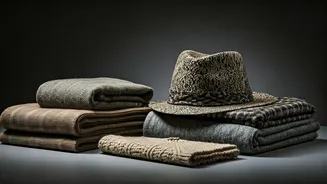Protein Powerhouse: Overview
Protein is an essential nutrient crucial for building and repairing tissues, producing enzymes and hormones, and supporting overall health. Achieving the
recommended daily protein intake is vital for various bodily functions, and it becomes even more critical for those aiming to build muscle, lose weight, or maintain an active lifestyle. Adequate protein consumption ensures proper muscle recovery after workouts, promotes satiety, and aids in maintaining a healthy metabolism. It’s important to understand the significance of protein and how it contributes to overall health. Incorporating protein-rich foods into the diet is essential for anyone looking to optimize their health and fitness levels.
Vegetarian Protein Choices
For vegetarians, there are several excellent sources of protein available. A Goa fitness coach recommends a selection of vegetarian options to help meet the daily protein needs. Top choices include tofu, which is versatile and can be used in numerous dishes; lentils, known for their high protein and fiber content; chickpeas, great for adding to salads or creating hummus; quinoa, a complete protein source; and paneer, a popular Indian cheese that can be incorporated into many recipes. Adding these options into the daily meals will help those who avoid meat. These foods provide a great source of protein and essential amino acids. Integrating these foods into your diet is a great way to boost protein without relying on meat.
Non-Vegetarian Protein Options
Non-vegetarians have a broader range of protein sources to choose from, according to a Goa fitness coach. Non-vegetarian foods recommended for protein include chicken, a lean protein source that is easily adaptable; fish, offering essential omega-3 fatty acids and high protein content; eggs, a versatile source of complete protein; and lean cuts of meat such as beef or lamb. The diversity of the non-vegetarian diet provides many alternatives. These options provide a comprehensive array of amino acids and other crucial nutrients. Non-vegetarians can easily incorporate these protein sources into a balanced diet to support their fitness goals and overall health.
Daily Protein Goals
Meeting daily protein requirements is crucial for all individuals, and a Goa fitness coach advises that the amount of protein needed varies depending on factors such as activity level, age, and individual health goals. For general health and to meet most people's needs, it is recommended that people consume 100 grams of protein daily. Protein supports muscle repair, helps with weight management, and plays a role in numerous other bodily functions. Athletes and individuals engaged in intense physical activities may need more protein to facilitate muscle recovery and growth. This amount of protein intake is also enough for maintaining muscle mass. Monitoring your protein intake and adjusting your diet accordingly is crucial for achieving optimal results.
Meal Planning Strategies
Meal planning is a valuable tool for ensuring adequate protein intake. A Goa fitness coach suggests that to integrate protein effectively, meals should be planned strategically. This involves incorporating protein sources into each meal. Create a plan to include protein-rich foods throughout the day, such as a breakfast including eggs or a protein shake, lunch with chicken or paneer, and a dinner featuring fish or lentils. Snacking between meals on protein-rich foods, such as nuts or Greek yogurt, will also help to meet your targets. Planning meals in advance also helps to avoid making unhealthy choices. A well-structured meal plan not only supports protein intake goals but also encourages balanced nutrition, ensuring overall health and wellness.
Dietary Flexibility
While adhering to protein targets is important, maintaining dietary flexibility is equally essential. According to the coach, the recommended food choices can be adapted to accommodate personal preferences and dietary restrictions, like a focus on vegetarian meals. It is possible to swap foods to tailor your protein intake to align with taste and personal preferences. To do this, one must find new options that are high in protein. Variety is important for nutritional balance, so make sure to explore different combinations of protein-rich foods, and embrace cultural variations in your meals. Dietary flexibility not only helps in making the diet more enjoyable but also helps in long-term adherence to healthy eating habits.
Complementary Nutrition
Protein intake should be paired with a comprehensive approach to nutrition. A Goa fitness coach recommends that protein consumption must be coupled with other vital components of a balanced diet, such as carbohydrates and healthy fats. Ensuring adequate intake of essential vitamins, minerals, and antioxidants is crucial. Include lots of fruits and vegetables in your meals. Proper hydration and sufficient water intake are essential to overall health. It is also important to consider the consumption of supplements to ensure proper intake of nutrients. This holistic approach ensures not just protein intake but also supports overall health and fitness.
Long-Term Lifestyle
The objective should be to establish sustainable healthy eating practices. The fitness coach emphasizes that incorporating protein-rich foods into your diet is a long-term commitment. One should find enjoyment in nutritious meals and create balanced dietary patterns that support your objectives over a long term. Consistency is important, so one should adopt practical tips to maintain discipline, and be aware of obstacles that may arise. Consider professional support from a nutritionist to assist you in designing a personalized and sustainable eating plan. Building healthy eating habits will promote overall health and longevity. It will also empower you to make informed decisions about nutrition.



















